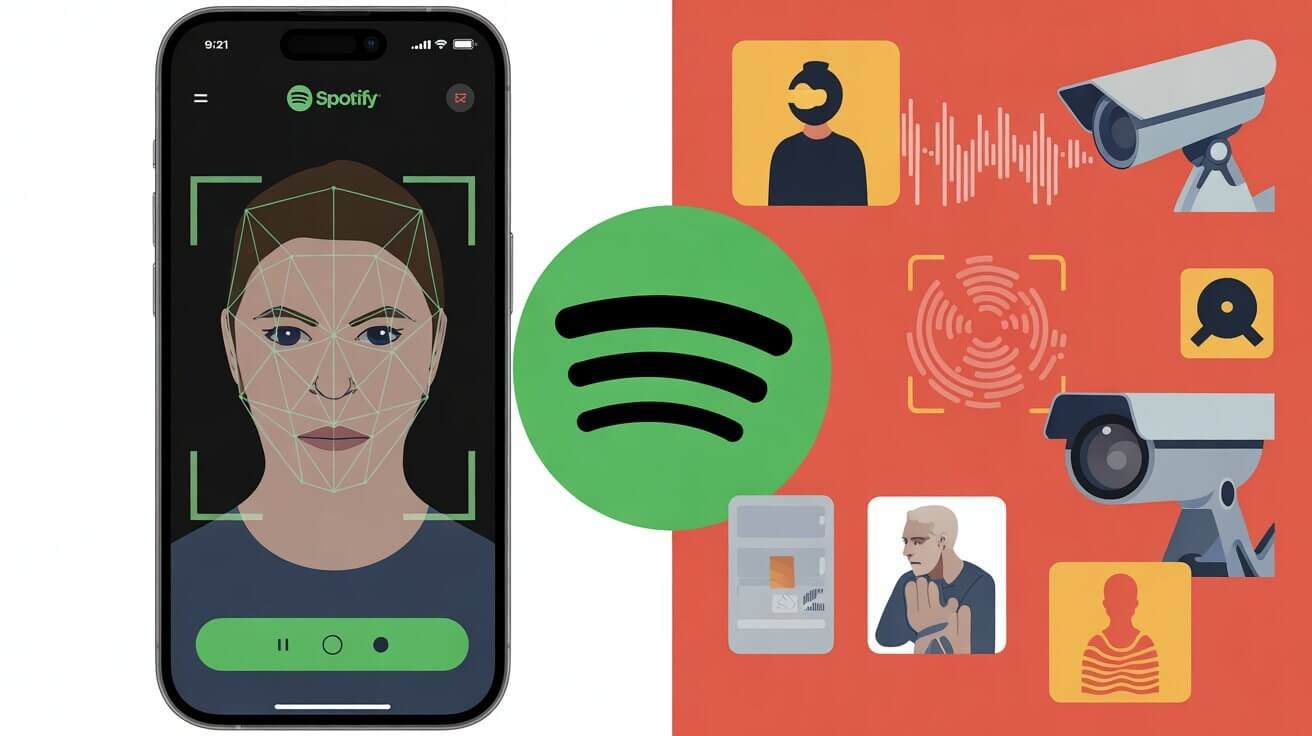You’re just trying to watch a music video, and suddenly Spotify wants to scan your face. Welcome to the new reality of streaming in 2025, where Spotify’s face scanning policy compliance determines whether you can access certain content – or lose your account entirely.
Following the UK’s Online Safety Act implementation last week, Spotify has introduced biometric age verification that uses facial recognition technology to determine if users are old enough to access 18+ content. Moreover, this Spotify face scanning policy represents a significant shift in how music streaming platforms handle user privacy and data collection.
What’s Really Happening with Spotify’s Face Scanning Policy
The Facial Recognition Reality Behind Spotify’s Age Verification
Spotify partnered with Yoti, a digital identity company, to implement what they call “facial age estimation technology.” When you try to access music videos labeled as 18+, you’ll encounter a prompt requiring age verification through one of two methods:
- Facial age estimation – Your device camera scans your face to estimate your age
- ID document verification – Upload your driver’s license or passport
Here’s the kicker: If you fail the age check or refuse to verify, Spotify will deactivate and eventually delete your account. The company gives users 90 days to complete ID verification if facial scanning fails, but after that grace period, your account gets permanently deleted.
Why Spotify’s Face Scanning Policy Is Happening Now
The catalyst for Spotify’s face scanning policy is the UK’s Online Safety Act, which went into effect on July 25, 2025. This legislation requires platforms to implement “highly effective” age verification for content deemed harmful to children.
Spotify isn’t alone in this shift. Reddit, Discord, X (formerly Twitter), and Bluesky have all implemented similar age verification measures. Even gaming platforms like Xbox have introduced voluntary age checks to comply with the new regulations.
The law carries serious consequences for non-compliance: platforms face fines of up to £18 million or 10% of their global revenue, whichever is higher.
The Privacy Concerns Behind Spotify Face Scanning Policy
What Yoti’s Facial Recognition Actually Collects
When you submit to Spotify’s face scanning policy, Yoti’s system captures and analyzes your facial features to estimate your age. Additionally, the company promises to delete all biometric data after the age check is complete, but critics question whether users can trust these assurances.
Yoti’s privacy policy reveals they collect:
- Facial images and biometric templates
- ID document information (if facial scanning fails)
- Device and browser information
- Age verification results
The company also generates “age tokens” that can be reused across different platforms, potentially creating a cross-platform tracking system.
The Broader Face Scanning Data Collection Picture
Spotify’s face scanning policy is just the latest addition to an already extensive data collection operation. The platform has faced criticism before for its invasive privacy practices, including a GDPR violation ruling where Swedish courts found the company failed to provide clear information about personal data handling.
Furthermore, Common Sense Privacy reports indicate that Spotify’s terms are “unclear whether this product collects biometric or health data,” highlighting the lack of transparency around biometric collection practices.
Real User Impact and Backlash Against Face Scanning Policy
Account Deletion Threats from Spotify’s Face Scanning Policy Spark Outrage
The most controversial aspect of Spotify’s face scanning policy is the threat of permanent account deletion. Users who’ve built years of playlists, purchased premium subscriptions, and collected music libraries face losing everything if they can’t or won’t verify their age.
Social media users have expressed frustration, with many questioning why they need to provide biometric data just to listen to music. “These policies will drive me and countless others to cancel our subscriptions,” one user complained on X.
Privacy Activists Sound Alarms About Face Scanning Policy
Digital rights organizations have raised serious concerns about Spotify’s face scanning policy implementation. The system creates several risks:
Discrimination Concerns: Facial recognition technology historically shows higher error rates for certain demographics, potentially discriminating against users based on age, race, or gender.
Data Breach Risks: The FTC has warned about the risks of collecting biometric information, noting that “large databases of biometric information could be attractive targets for malicious actors.”
Function Creep: Once biometric collection infrastructure exists, there’s risk it could expand beyond age verification to other purposes.
The VPN Workaround Surge Against Spotify Face Scanning
Predictably, users are finding ways around Spotify’s face scanning policy. VPN usage has surged as people connect to servers in countries without age verification requirements. However, this approach comes with its own privacy and security risks, especially when using free VPN services.
Practical Steps to Protect Your Privacy from Face Scanning
Understanding Your Options
If you’re facing Spotify’s age verification requirements, you have several choices:
Complete the Verification: Submit to facial scanning or upload ID documents, accepting the privacy trade-offs.
Use ID Verification Instead: If facial scanning feels too invasive, you can verify using government-issued identification.
Account Migration: Consider switching to alternative music platforms that don’t require biometric verification.
Privacy Protection Strategies
Review Your Spotify Privacy Settings: Navigate to Account > Privacy Settings and disable data sharing where possible.
Use Secure Networks: If using a VPN to avoid verification, choose reputable providers with strong privacy policies and encryption.
Monitor Your Data: Regularly review what personal information Spotify has collected through their data download tool.
Consider Alternative Platforms: Research music streaming services that don’t implement facial recognition or extensive biometric collection.
Understanding Your Rights
Under GDPR and similar privacy laws, you have rights regarding your biometric data:
- Right to know what data is collected
- Right to request data deletion
- Right to object to processing
- Right to data portability
However, exercising these rights might conflict with platform access requirements under age verification laws.
Future Implications of Spotify’s Face Scanning Policy for Digital Privacy
The Normalization of Biometric Face Scanning Surveillance
Spotify’s face scanning policy represents a broader trend toward normalizing biometric collection in everyday digital services. What starts as age verification could expand to mood detection, health monitoring, or behavioral analysis.
Similarly, other platforms are likely watching Spotify’s implementation closely. If users accept facial scanning for music access, expect similar requirements to spread across gaming platforms, social media, and streaming services.
Regulatory Ripple Effects of Face Scanning Policy
The UK’s approach is influencing legislation globally. The EU’s Digital Services Act includes similar provisions, and other countries are considering comparable measures. Consequently, users worldwide may soon face biometric verification requirements across multiple platforms.
Face Scanning Technology Evolution Beyond Spotify
Age verification technology continues advancing beyond simple facial scanning. Future systems might include:
- Voice pattern analysis
- Behavioral biometrics
- Continuous monitoring
- Cross-platform identity verification
The Real Cost of “Safety”
While Spotify frames its face scanning policy as protecting children, critics argue the cure is worse than the disease. The system creates new privacy risks while potentially driving users toward less regulated platforms.
Digital rights advocates worry about the precedent this sets. If major platforms like Spotify can require biometric verification for basic services, where does it end?
The UK’s Online Safety Act has already faced significant backlash, with over 420,000 people signing a petition calling for its repeal. The UK Reform party has promised to overturn the law, calling it “borderline dystopian.”
Conclusion
Spotify’s face scanning policy marks a turning point in digital privacy. Users must now choose between biometric surveillance and losing access to their music libraries. Furthermore, this shift reflects broader tensions between child safety, corporate compliance, and individual privacy rights.
The implications extend far beyond music streaming. As governments worldwide implement similar legislation, biometric verification may become standard across digital services. Therefore, users need to understand these changes and their privacy implications before they become irreversible.
The question isn’t whether you trust Spotify with your facial data today – it’s whether you’re comfortable with a future where biometric verification is required for basic digital services. Because once we normalize face scanning for music, there’s no going back.








